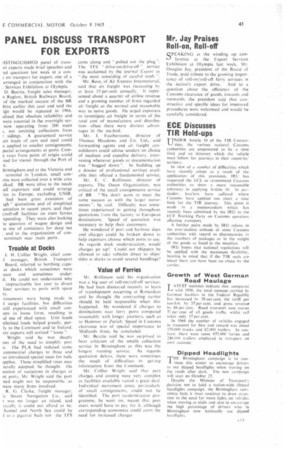PANEL DISCUSS TRANSPORT FOR EXPORTS
Page 45

If you've noticed an error in this article please click here to report it so we can fix it.
1STINGUISHED panel of transirt experts made brief Speeches and ed questions last week at a conon transport for export, one of a arranged in conjunction with the Services Exhibition at Olympia. D. Beanie, freight sales manager, • Region. British Railways Board, of the marked success of the BR hive earlier this year and said the in would be repeated in 1966. alized, that absolute reliability and were essential in the overnight sernow operating from 200 main ;. not omitting collections from sidings. A guaranteed service lin loads of cars and steel could e applied to smaller consignments, pecial arrangements at ports. Corn e rates from point of origin could )ted for transit through the Port of II.
iirmingham and at the Victoria and terminal in 'London. small con-. !tits were collected over a wide area Jilted. BR were alive to the needs iall exporters and could arrange ries in Europe. excluding USSR. had been great extension of igh " quotations and of simplified entation in recent years. and their ifroll-off facilities on train ferries xpanding. They were also looking le question of wagon design and le use of containers for deep sea , and to the organization of conterminals near main ports.
Trouble at Docks
1. H. Collier Wright, chief corn1 manager. British Transport Board, referred to berthing capaa1 docks which sometimes were uate and sometimes underd. He could not understand why , impracticable last year to divert liner services to ports with spare ty.
rovements were being made in 1 cargo facilities. hut difficulties still experienced with .small conmis in loose form. resulting in ul use of shed space. Unit loads alletized loads helped greatly, party to the Continent and to Ireland. my exports still arrived " loose ".
Wright said he was deeply oils of the need to simplify port s. The PLA had reduced some commercial charges to three and so introduced special rates for bulk ipplies. These simplified rates may lerally adopted. he thought. Ott iestion of variations in charges at nt ports, Mr. Wright said the port ned might not be responsible. as were many firms involved.
R. G. Clarke. freight manager. iv Steam Navigation Co.. said I was no longer an island, and -nically it could not afford to he. 'hattriel and North Sea could be
to a gigantic bath tubthe TES came along and "Tuned out the plug ". The TES " drive-on/drive-off " service was acclaimed by the journal Exporr as " the most rewarding of careful study
Mr. Ross, of Air Express International, said that air freight was increasing by at least 15 per cent annually. It represented about a quarter of airline revenue and a growing number of firms regarded air freight as the normal and reasonable way to move goods. He urged exporters to investigate air freight in terms of the total cost of manufacture and distribution—often there were distinct advantages in the ine:hod.
Mr. J. Featherstone, director of Thomas Meadows and Co. Lid., said forwarding agents and air freight consolidators could advise senders on choice of medium and expedite delivery, intervening whenever goods or,docurrientaion was "bogged down ". In building up a dossier of professional. services available they offered a fundamental service.
Mr. E. C. Rollinson, director of exports. The Owen Organization, was critical of the small consignments service of BR " We don't seem to meet the same success as with the larger movements ", he said. Difficulty was sometimes experienced in getting throughout quotations from the factory to European destinations. Speed of quotation was necessary to help their customers.
He wondered if port and harbour dues and charges could be broken down to help exporters choose which ports to use. As regards dock modernization, would charges go up? Could not shippers be allowed to take vehicles direct to ships' sides at docks to avoid several handlings'!
Value of Ferries
Mr, Rollinson said his organization was a big user of roll-on/roll-off services. He had been dismayed recently to learn of transhipment occurring at Rotterdam and he thought the contracting carrier should be held responsible when this happened. He wondered if charges to destinations near ferry ports compared reasonably with longer journeys, such as to Hanover or Zurich. Speed in Customs clearance was of special importance to Midlands firms, he concluded.
Mr. Beattie-said he was surprised to hear criticism of the smalls collection service in Birmingham as this was the longest running service. As regards quotation delays, these were sometimes the result of difficulties in get:ing information from the Continent.
Mr. Collier Wright said that port charges and costing were very complex as facilities available varied a great deal. Individual movement costs, paracularly of small eonkignments. could not he identified. The port modernization programme, he went on. meant that port users would have to pay for it. although corresponding economies could avert the need for increased charges


















































































































































